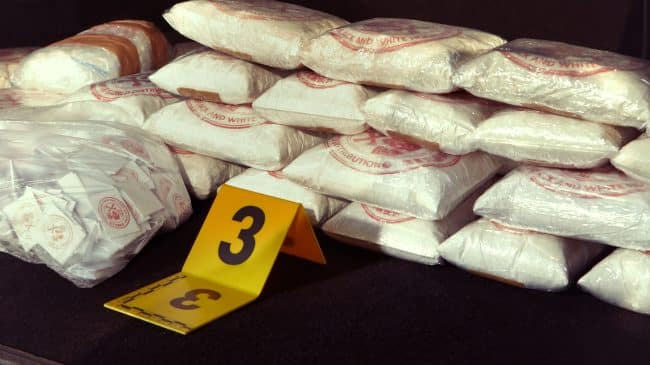Years ago I was at the airport trying to sneak a small tube of toothpaste through security. This is not because I enjoy bedeviling the TSA, but it was a long trip and I wanted to be able to brush my teeth during a layover. But of course I got caught. The TSA agent looked at her x-ray monitor, then thrust her hand into a small inner pocket of my purse and withdrew the offending tube with a flourish. She brandished it in front of me, saying, “now you know you can’t have toothpaste!” Then she blithely tossed it in the trash on top of sewing scissors, water bottles and other contraband.
Her words struck me. I believed she knew that the tube contained nothing but toothpaste, but, having equated toothpaste, water and any number of substances with bomb-building materials and terrorism, her mind had transferred the danger of bombs to these substances: Toothpaste itself had become evil.
Unfortunately, if we don’t remain vigilant, police work can suffer the same fallacy of transference. I found this to be true in the LAPD South Bureau Narcotics unit, where I had gained a coveted spot after working years of patrol.
Patrol officers respond to radio calls, citizen flagdowns, and whatever they might observe while patrolling the streets of their beat, often assisting people in crisis or danger, and quelling angry disputes through interpersonal skills or, if necessary, force. The common domestic dispute provides a great example. While many clear cases of domestic abuse terminate with arrest, police often arrive when tensions are escalating, but no crime has yet occurred—likely just a lot of pushing, screaming and threats that cause neighbors to call the police. But the children are terrified, there are holes in the wall, items are broken, and even police presence is no deterrence as the couple continues their dispute. What do police do in such a case? They do what they can to calm the situation at the time, which is usually finding a way to separate the couple temporarily to give them a chance to cool down. First, run the most out-of-control person for warrants and make an arrest. No warrants? Then ask if one of the two people can go to a relative’s or friend’s house for the night, and sometimes even provide the transport there, reducing the chance for harm, at least for that night. The point is, the police are doing what they do best—focusing their authority and applying the law in the service of mitigating harm to people. When law enforcement’s done right, with a focus on the people involved, it’s good police work.
Narcotics works differently, changing the incentives for officers and thereby changing the nature of police work. Mandatory minimum sentences have made the illicit drug trade so consequential that many drug dealers, especially in customer-heavy places like South L.A., are extremely picky about who they’ll sell to. As a result, it’s virtually impossible for even the most convincing undercover officer to buy there. Our team employed a “CI” (confidential informant) to buy for us, so we could show that a certain house was selling illicit drugs, as grounds for a search warrant. Our CI looked the part because she was a crack addict herself who lived on the streets. We gave her a $20 bill we’d photographed for ID purposes for her to buy with, and from a distance watched with binoculars as she bought the drugs. She then swapped the drugs with us for her own payment of $20, which she then left with to buy crack. CI drug buys are extremely dangerous, because if the sellers get even a whiff of suspicion that she’s working for the police, they’ll put a hit out on her. Our team often bemoaned how dangerous this was for her and were genuinely worried for her safety, but since the job of narcotics units is seizing large quantities of illegal drugs, the team had developed an ends-justify-the-means mentality—we needed the CI to get to the drugs, no matter how dangerous the buy was.
Soon after, we’d serve the search warrant, pulling off the front doors, rushing in through the house, and yelling for everyone to lie down on the floor. Such rush tactics were necessary to preclude suspects’ destroying the drugs we wished to seize. Often these drug-selling operations had children milling about, and while officers—many of whom have children themselves—tried not to scare the children, it was inevitable, given our military-style clothing, helmets, automatic rifles, and the fact that we were forcing the adults who cared for them onto the floor against their will. Once everyone was handcuffed, the situation calmed. We seized the drugs, guns (which were always plentiful), and often money (to include the photographed bill our CI used, as proof of sale) and determined which suspects to arrest. Eventually we left the scene with these items and arrestees, but that left behind children and people we’d let go, who may not have had any other shelter, in a house without a front door.
It’s a different mindset from back on patrol, where the law is supposed to be used to protect people from harm. In narcotics, the goal was “dope on the table”—the more the better. Back at the station we carefully weighed it and booked it all into evidence, which generally resulted in fairly long sentences for the individuals we had arrested. These drug sellers were typically hardened gang members who lived by the sword themselves—not Citizen of the Year material—but it’s difficult to conclude that those arrests and seizures were worth the upheaval caused, especially to those who were not charged (who were still part of the drug selling operation, but not main players), or the truly innocent bystanders—children, or neighbors who might have been injured if we did shoot someone, as bullets often go through walls.
Illegal drug activity is certainly responsible for widespread collateral violence due to the territoriality of selling in the black market and the desperate nature of addiction. But when laws and practices prioritize seizure of the drugs themselves, they encourage police to see the drugs as the primary target, with little regard for potential or actual damage to people. This transference of focusing on the social harms caused by illegal drug activity to targeting the drugs themselves rewards officers for disregarding human harm. These narcotics search warrants create dangerous environments—the opposite of what police work is intended to do. This is because, for narcotics units, success is not measured in crime but in kilos.
My patrol sergeant used to tell us about our cop conscience, saying it was something we had to consciously develop. “If you’re doing something and you get a bad feeling about it, you better listen to that because it’s probably your cop conscience,” he would say. “Stop and make sure you have the legal grounds to do what you’re doing, and that it’s right morally.” That works on patrol, where officers are focused on harm to people, but not in narcotics. The longer that officers work in the drug interdiction environment, continuing to view the drugs themselves as the danger, the more their cop conscience erodes, as “dope on the table” replaces preventing harm to people as the moral objective.
When illegal drugs are considered evil themselves, then soon police officers can’t tell the bombs from the toothpaste. My narcotics unit teammates had been fine patrol officers—which is why they were selected for the narcotics unit to start with—but laws, policies and public attitudes that reward looking for “toothpaste,” not “bombs,” undermine what good police work should be. Surely there’s a more effective way to deal with our society’s pervasive drug problems. But recognizing that good police work should “first, do no harm” is a solid first step.

